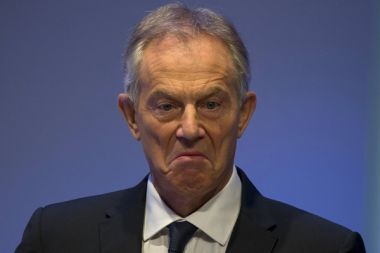Tony Blair: 'Elements of truth' that Iraq war caused rise of ISIS

For the first time, former British prime minister Tony Blair has apologised for the "mistakes" made in the US-led invasion of Iraq in 2003. At the same time, he admitted partial responsibility for the rise of the Islamic State jihadist organisation.
Blair made the statement in an exclusive interview on CNN's Fareed Zakaria GPS that aired on Sunday.
However, Blair said he does not regret ousting Iraqi dictator Saddam Hussein who was later executed by the Iraqi government that took over control of the country.
"I find it hard to apologise for removing Saddam. I think, even from today in 2015, it is better that he's not there than that he is there," Blair said.
Saddam gained notoriety for his oppression of the people of Iraq whom he ruled for more than three decades. He also launched wars against neighbours Iran and Kuwait and used chemical weapons against the Kurds in northern Iraq.
But Blair acknowledged that he and other Western leaders made a mistake in trusting and relying on the intelligence information they received on Saddam's military strength, especially his rumoured "weapons of mass destruction."
"I can say that I apologise for the fact that the intelligence we received was wrong because, even though he [Saddam] had used chemical weapons extensively against his own people, against others, the programme in the form that we thought it was did not exist in the way that we thought," Blair told Zakaria.
Blair was referring to supposed intelligence reports that Saddam's regime possessed weapons of mass destruction. This served as the basis for justifying the joint US-British operation to invade Iraq and topple Saddam.
Later on, the intelligence reports on Saddam's "weapons of mass destruction" turned out to be false and no such weapon was found in the extensive search conducted by allied troops after Iraq fell.
The war that followed between pro-Saddam fighters and Iraqi forces backed up by US and British troops led to deadly sectarian violence that experts said led to the birth of al Qaeda terrorist organisation in Iraq, which then branched out into today's ISIS.
Tens of thousands of Iraqis aside from more than 4,000 US troops and 179 British servicemen lost their lives in the war.
Besides the faulty Iraq intelligence, Blair also apologised "for some of the mistakes in planning and, certainly, our mistake in our understanding of what would happen once you removed the regime."
Blair admitted that there are "elements of truth" in the view that the 2003 invasion of Iraq was the principle cause of the rise of ISIS.
"Of course, you can't say that those of us who removed Saddam in 2003 bear no responsibility for the situation in 2015," he said. "But it's important also to realise, one, that the Arab Spring which began in 2011 would also have had its impact on Iraq today, and two, ISIS actually came to prominence from a base in Syria and not in Iraq."
Blair said the judgment on whether it was right for the allies to intervene in Iraq and elsewhere is still unclear. "We have tried intervention and putting down troops in Iraq; we've tried intervention without putting in troops in Libya; and we've tried no intervention at all but demanding regime change in Syria," he said. "It's not clear to me that, even if our policy did not work, subsequent policies have worked better."
Zakaria pointedly asked Blair what he feels about being branded a "war criminal" for his decision to go into Iraq.
Blair said he made what he thought was the right call at the time. "Now, whether it's right or not, that's for—everyone can have their judgment about that," he said.











